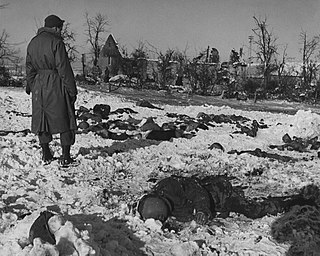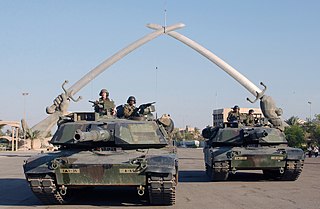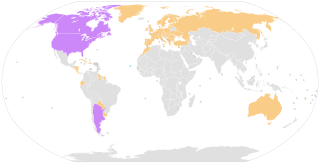
The European Convention on Human Rights is an international convention to protect human rights and political freedoms in Europe. Drafted in 1950 by the then newly formed Council of Europe, the convention entered into force on 3 September 1953. All Council of Europe member states are party to the Convention and new members are expected to ratify the convention at the earliest opportunity.

A war crime is a violation of the laws of war that gives rise to individual criminal responsibility for actions by combatants in action, such as intentionally killing civilians or intentionally killing prisoners of war, torture, taking hostages, unnecessarily destroying civilian property, deception by perfidy, wartime sexual violence, pillaging, and for any individual that is part of the command structure who orders any attempt to committing mass killings including genocide or ethnic cleansing, the granting of no quarter despite surrender, the conscription of children in the military and flouting the legal distinctions of proportionality and military necessity.
Civilians under international humanitarian law are "persons who are not members of the armed forces" and they are not "combatants if they carry arms openly and respect the laws and customs of war". It is slightly different from a non-combatant, because some non-combatants are not civilians. Civilians in the territories of a party to an armed conflict are entitled to certain privileges under the customary laws of war and international treaties such as the Fourth Geneva Convention. The privileges that they enjoy under international law depends on whether the conflict is an internal one or an international one.

An unlawful combatant, illegal combatant or unprivileged combatant/belligerent is a person who directly engages in armed conflict in violation of the laws of war and therefore is claimed not to be protected by the Geneva Conventions. The International Committee of the Red Cross points out that the terms "unlawful combatant", "illegal combatant" or "unprivileged combatant/belligerent" are not defined in any international agreements. While the concept of an unlawful combatant is included in the Third Geneva Convention, the phrase itself does not appear in the document. Article 4 of the Third Geneva Convention does describe categories under which a person may be entitled to prisoner of war status. There are other international treaties that deny lawful combatant status for mercenaries and children.

The law of war is the component of international law that regulates the conditions for initiating war and the conduct of warring parties. Laws of war define sovereignty and nationhood, states and territories, occupation, and other critical terms of law.

Non-combatant is a term of art in the law of war and international humanitarian law to refer to civilians who are not taking a direct part in hostilities; persons, such as combat medics and military chaplains, who are members of the belligerent armed forces but are protected because of their specific duties ; combatants who are placed hors de combat; and neutral persons, such as peacekeepers, who are not involved in fighting for one of the belligerents involved in a war. This particular status was first recognized under the Geneva Conventions with the First Geneva Convention of 1864.

Military occupation, also known as belligerent occupation or simply occupation, is the effective military control by a ruling power over a territory that is outside of that power's sovereign territory. The territory is then known as the occupied territory and the ruling power the occupant. Occupation is distinguished from annexation and colonialism by its intended temporary duration. While an occupant may set up a formal military government in the occupied territory to facilitate its administration, it is not a necessary precondition for occupation.
International humanitarian law (IHL), also referred to as the laws of armed conflict, is the law that regulates the conduct of war. It is a branch of international law that seeks to limit the effects of armed conflict by protecting persons who are not participating in hostilities and by restricting and regulating the means and methods of warfare available to combatants.
Refugee law is the branch of international law which deals with the rights and duties states have vis-a-vis refugees. There are differences of opinion among international law scholars as to the relationship between refugee law and international human rights law or humanitarian law.
International adoption is a type of adoption in which an individual or couple residing in one country becomes the legal and permanent parent(s) of a child who is a national of another country. In general, prospective adoptive parents must meet the legal adoption requirements of their country of residence and those of the country whose nationality the child holds.

The Hague Convention for the Protection of Cultural Property in the Event of Armed Conflict is the first international treaty that focuses exclusively on the protection of cultural property in armed conflict. It was signed at The Hague, Netherlands, on 14 May 1954 and entered into force on 7 August 1956. As of September 2018, it has been ratified by 133 states.

The Convention on the Taking of Evidence Abroad in Civil or Commercial Matters—more commonly referred to as the Hague Evidence Convention—is a multilateral treaty which was drafted under the auspices of the Hague Conference on Private International Law (HCPIL). The treaty was negotiated in 1967 and 1968 and signed in The Hague on 18 March 1970. It entered into force in 1972. It allows transmission of letters of request from one signatory state to another signatory state without recourse to consular and diplomatic channels. Inside the US, obtaining evidence under the Evidence Convention can be compared to comity.

The Hague Convention on parental responsibility and protection of children, or Hague Convention 1996, officially Convention of 19 October 1996 on Jurisdiction, Applicable Law, Recognition, Enforcement and Co-operation in respect of Parental Responsibility and Measures for the Protection of Children or Hague Convention 1996 is a convention of the Hague Conference on Private International Law. It covers civil measures of protection concerning children, ranging from orders concerning parental responsibility and contact to public measures of protection or care, and from matters of representation to the protection of children's property. It is therefore much broader in scope than two earlier conventions of the HCCH on the subject.
An unaccompanied minor is a child without the presence of a legal guardian.

The Martens Clause was introduced into the preamble to the 1899 Hague Convention II – Laws and Customs of War on Land. The clause took its name from a declaration read by Friedrich Martens, the delegate of Russia at the Hague Peace Conferences of 1899. It reads as follows:
Until a more complete code of the laws of war is issued, the High Contracting Parties think it right to declare that in cases not included in the Regulations adopted by them, populations and belligerents remain under the protection and empire of the principles of international law, as they result from the usages established between civilized nations, from the laws of humanity and the requirements of the public conscience.

The Geneva Conventions are four treaties, and three additional protocols, that establish international legal standards for humanitarian treatment in war. The singular term Geneva Convention usually denotes the agreements of 1949, negotiated in the aftermath of the Second World War (1939–1945), which updated the terms of the two 1929 treaties and added two new conventions. The Geneva Conventions extensively define the basic rights of wartime prisoners, civilians and military personnel, established protections for the wounded and sick, and provided protections for the civilians in and around a war-zone.
Iran is a member of the WIPO since 2001 and has acceded to several WIPO intellectual property treaties. Iran joined the Convention for the Protection of Industrial Property in 1959. In December 2003 Iran became a party to the Madrid Agreement and the Madrid Protocol for the International Registration of Marks. In 2005 Iran joined the Lisbon Agreement for the Protection of Appellations of Origin and their International Registration, which ensures the protection of geographical names associated with products. As at February 2008 Iran had yet to accede to The Hague Agreement for the Protection of Industrial Designs.
The term international child abduction is generally synonymous with international parental kidnapping,child snatching, and child stealing. However, the more precise legal usage of international child abduction originates in private international law and refers to the illegal removal of children from their home by an acquaintance or family member to a foreign country. In this context, "illegal" is normally taken to mean "in breach of custodial rights" and "home" is defined as the child's habitual residence. As implied by the "breach of custodial rights," the phenomenon of international child abduction generally involves an illegal removal that creates a jurisdictional conflict of laws whereby multiple authorities and jurisdictions could conceivably arrive at seemingly reasonable and conflicting custodial decisions with geographically limited application. Such a result often strongly affects a child's access and connection to half their family and may cause the loss of their former language, culture, name and nationality, it violates numerous children's rights, and can cause severe psychological and emotional trauma to the child and family left behind.

The Hague Convention on the International Recovery of Child Support and Other Forms of Family Maintenance, also referred to as the Hague Maintenance Convention or the Hague Child Support Convention is a multilateral treaty governing the enforcement of judicial decisions regarding child support extraterritorially. It is one of a number of conventions in the area of private international law of the Hague Conference on Private International Law in 2007. The convention is open to all states as well as to Regional Economic Integration Organizations as long as they are composed of sovereign states only and have sovereignty in the content of the convention. The convention entered into force on 1 January 2013 between Norway and Albania, with Bosnia-Herzegovina (2013), Ukraine (2013), the European Union, Montenegro (2017), United States (2017), Turkey (2017), Kazakhstan (2017), Brazil (2017), Honduras (2017), Belarus (2018), Guyana (2020), Nicaragua (2020), United Kingdom (2021), Serbia (2021), New Zealand (2021), Ecuador (2022), Botswana (2022) and Azerbaijan (2023) following suit. Because the EU acceptance of the convention applies in 27 EU countries, the convention applies in 45 countries worldwide.











